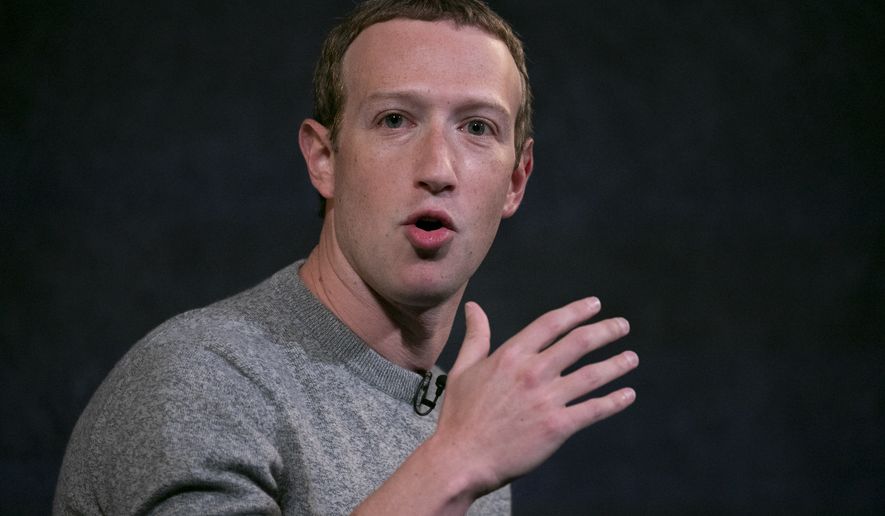Facebook is under attack for its business practices from a coordinated group of liberal organizations as the social media giant privately courts conservative allies for a possible regulatory showdown in Washington.
Conservatives, however, have largely rejected the company’s advances.
Liberal critics despise the company’s willingness to associate with conservatives and to permit them on the company’s platform. They have started a relentless anti-Facebook public relations campaign organized by Unbendable Media, a liberal media relations firm in Washington and New York that formed in 2016 as a successor to the defunct FitzGibbon Media.
Unbendable Media represents Media Matters, a liberal watchdog group, and Demand Justice, a liberal advocacy group focused on the federal judiciary. Both groups undertook campaigns against Facebook in November.
Media Matters on Nov. 5 flew a plane over Facebook headquarters in Menlo Park, California, trailing a banner reading “Facebook Right Wing Lies.” Unbendable Media sent reporters photos of the escapade.
The group also has been hammering Facebook with “studies” for several months arguing that the company is not censoring but boosting conservative messages.
Demand Justice jumped on Facebook’s decision to be a “Gold Circle” sponsor of the right-leaning Federalist Society’s annual convention Nov. 14 in Washington featuring Supreme Court Justice Brett M. Kavanaugh as a keynote speaker.
Demand Justice made ads, shared by Unbendable Media, ahead of Justice Kavanaugh’s speech. The ads criticized Facebook’s association with the Federalist Society and the justice, and it solicited the tech company’s employees to work anonymously with its activists. Demand Justice also reportedly distributed the ads on LinkedIn aimed at Facebook employees and targeted internet users near Facebook’s headquarters.
The following week, word leaked to NBC that Mr. Zuckerberg had met privately with President Trump in October. The Facebook CEO was visiting Washington to testify before the House Financial Services Committee. A week earlier, Mr. Zuckerberg spoke about the company’s political advertising policy at Georgetown University.
Unbendable Media’s coalition mobilized around the Trump-Zuckerberg rendezvous news by hawking a statement from Media Matters CEO Angelo Carusone saying, “Facebook is now the single greatest enabler of right-wing propagandists, liars and extremists.”
Facebook responded to the mounting attacks by publicly staying the course and privately looking for allies on the right.
Since July, Mr. Zuckerberg has met privately with influential conservatives such as Fox News personality Tucker Carlson and commentator Ben Shapiro. More recently, the company embraced various conservatives in public.
A Facebook representative told liberal activist Judd Legum that the company would continue to support the Federalist Society despite scrutiny from the left. A spokesman for the Federalist Society, however, did not comment to The Washington Times about Facebook’s ongoing support.
Company officials also visited a closed-door gathering of the Republican Main Street Partnership in Washington during the week of Nov. 18. At the moderate Republicans’ first-ever candidate school, Facebook taught prospective congressional candidates about the proper way to build a digital campaign.
On Nov. 21, Facebook held an invitation-only event at the Long View Gallery to discuss how the company was preparing for the 2020 elections. Facebook’s publicly available invitation revealed that the company intended to discuss “the steps we are taking to protect elections from the executives leading this charge” and “how we are thinking about stopping election interference, preventing the spread of misinformation and enforcing our Community Standards from our content policymakers.”
Eric Wilson, a Republican digital strategist who worked for the 2016 presidential campaign of Sen. Marco Rubio of Florida, attended the event and said afterward that he believes Facebook is incompetent.
“I think they are certainly trying to remain in more frequent contact with people in our industry because I think they know they’re sailing through rough waters at this moment,” Mr. Wilson told The Washington Times. “But unfortunately, they’re not taking our feedback and input very seriously.”
The criticism from the left and right appears to have Mr. Zuckerberg rethinking his firm stance regarding political advertising and free expression on his platform. Facebook has not announced any changes to its political advertising policy since Mr. Zuckerberg’s October visit to Washington, but The Wall Street Journal has reported that Facebook is considering limiting the scope of the targets of political ads.
The company already has taken steps to ensure that bad actors do not interfere with political or governmental communications. A program called Facebook Protect offers 2020 candidates, elected officials and campaigns additional digital tools to safeguard their accounts.
• Ryan Lovelace can be reached at rlovelace@washingtontimes.com.




Please read our comment policy before commenting.